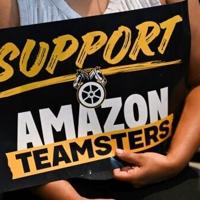The Teamsters, the United States’ second largest labor union, have decided not to endorse either Kamala Harris or Donald Trump for the upcoming presidential election in November.
What impact will this decision have on the election? And can the support of several local branches in key swing states that have chosen to back Harris despite the union’s stance make a difference?
– Who are the Teamsters? –
Also known as the International Brotherhood of Teamsters, this union, with around 1.3 million members, was established in 1903.
From initially representing truck drivers, it has expanded to include members from various sectors such as agriculture, law enforcement, healthcare, and aviation, negotiating and advocating for them when needed.
According to their website, a unionized private sector employee earns on average 38 percent more than a non-unionized one and receives 54 percent more benefits.
– What do they think of the candidates? –
The Teamsters’ leadership announced on Wednesday that they would not be endorsing either candidate, citing a lack of majority support for Democrat Harris or Republican Trump among their members.
The organization’s president, Sean O’Brien, argued that neither candidate has shown strong commitments to supporting labor.
Despite the official decision, many local branches, particularly in swing states like Nevada, Wisconsin, Michigan, and Pennsylvania, have thrown their support behind Harris, which could be crucial under the US electoral college system.
– Who have they supported previously? –
The Teamsters have supported every Democratic candidate for president since Al Gore in 2000.
Prior to that, they endorsed Republicans Ronald Reagan in 1984 and George H.W. Bush in 1988 before switching to Democrat Bill Clinton in 1992.
In 1996, during the Clinton vs. Bob Dole election, the Teamsters abstained from endorsing a candidate.
– What does this mean for Harris and Trump? –
Nelson Lichtenstein, a labor relations expert from the University of California, believes this decision could benefit Trump by allowing him to claim working-class support.
For Paul Clark, a professor specializing in corporate labor relations at Pennsylvania State University, the abstention may be disappointing for Harris but may not be very significant in the grand scheme of things.
National support from unions could be crucial for the candidates as it mobilizes grassroots efforts, potentially influencing the election outcome in a close race.
While the Teamsters’ decision is a setback for Harris, she still has the backing of other major unions in addition to support from local branches, which could help offset the impact.
According to Clark, the endorsement from local unions may ultimately have a greater impact on the election outcome and could push Harris across the finish line.
elm/ube/st/jgc




